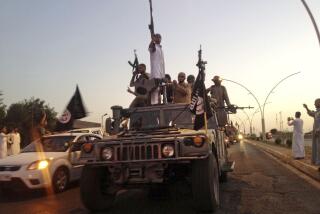One of Iraq’s Most Wanted Reportedly Dies
- Share via
BAGHDAD — One of the most wanted men in Iraq, who served as chief deputy to former President Saddam Hussein, has died, according to reports in Arabic media outlets Friday.
Izzat Ibrahim, 63, was believed to be a key financier and strategist for the bloody insurgency that followed the U.S.-led 2003 invasion of Iraq that toppled the Hussein regime. He had been diagnosed with cancer at least six years ago.
Along with Hussein and Vice President Taha Yassin Ramadan, Ibrahim was the only surviving participant in the 1968 coup that brought the Sunni-dominated Baath Party to power in Iraq. U.S. military sources said they were investigating the reports of his death, which could not be independently confirmed Friday. The media reports did not say where Ibrahim had died.
Ibrahim was the highest-ranking official of the Hussein regime still at large and the U.S. had posted a $10-million reward for his capture or death. In the original list of 55 high-level fugitives prepared in playing card form by U.S. officials, Ibrahim was assigned the status of king of clubs.
Many Iraqis greeted the news of the death of Ibrahim, who was being hunted for his role in the chemical bombing of Kurdish villages in 1988 among other alleged crimes, with happiness mixed with chagrin that he had yet again escaped justice. Hussein and seven other former regime officials have been charged with human rights violations and are being held for eventual trial.
“I feel sad because he was not presented to the trial as his fellow criminals. He should have been captured alive. Everybody hates him, he was a big man in Saddam government, and he supported Saddam from the beginning,” said Ihab Issa, 23, a civil engineer. “He made many crimes by his hands.”
“A very dirty page, a dark period in the Iraqi recent political history was wrapped up,” said Ahmed Salman, a Baghdad engineer. “We got rid of a source of unrest. The death of this man and the expected execution of Saddam will leave the Baathists without a leader, and the violence will be much less.”
Terrorism experts called Ibrahim’s death a blow to the insurgency. John Pike, director of GlobalSecurity.org, a Washington D.C.-based military affairs think tank, said that Ibrahim, a devout Sunni Arab, linked Islamist fighters with Baath Party insurgents.
“I think that [Al Qaeda in Iraq leader] Abu Musab Zarqawi would have had a very hard time doing what he was doing without Ibrahim and his circle of influence,” Pike said.
Ibrahim played a major role in guiding Hussein’s religious overtures toward Sunni Arabs after the 1991 Shiite uprising following the Gulf War.
He helped to move the Baath Party away from its secular roots by attracting fundamentalist Sunni Muslim clerics from around the Middle East and guiding a massive mosque-construction campaign. Hussein’s efforts sufficiently solidified his Sunni base to fend off revolts by other sects and ethnic groups.
Ibrahim was perhaps best known in the West for his infamous exchange with a Kuwaiti representative at an emergency conference of Middle East nations two weeks before the war began in 2003.
“Shut up you monkey, you cretin!” he yelled. “Allah curse your mustache, you traitor!”
Ibrahim’s great wealth at the end of his life belied his hardscrabble origins as the son of an ice seller. Like Hussein, Ibrahim came from the Tikrit region and belonged to the same clan as the former president.
Ibrahim, a small-framed, red-headed man, met Hussein in prison in the 1960s and thereafter participated in the Baath Party’s bloody takeover of the government. Ibrahim’s daughter wedded Hussein’s son, Uday, but the couple later divorced.
Hussein chose Ibrahim to be his northern military commander in the 1980s -- a period when the regime killed thousands of Kurds with chemical weapons.
When coalition forces took over Baghdad in 2003, Ibrahim was believed to be in the north of the country. The U.S. military has been looking for him since.
It was unclear on Friday where he had been hiding, but many Iraqis believe he has been in Saudi Arabia or Syria, countries where he has good relationships with Baathist sympathizers.
On Friday, Hussein supporters mourned his death.
“He was a prominent Baathist and a faithful Muslim who really served his country,” said Faisal Azawi, a 42-year-old former party member in Baghdad.
“He was the friend of several Arab leaders including the Saudis, and he represented Iraq in many international and pan-Arab conferences. His death is a loss for the Baathists and Arabs.”
“Izzat is a hero for us. If this is true, we lost a big sheik in the resistance against the occupation and the [Iraqi] collaborators,” said Mousafa Saleh, 32, a Baghdad taxi driver. “He was a big aide for Saddam, we will lose his money and his guidance, but the resistance will continue -- maybe it will be affected, but it will go on.”
Times staff writers Suhail Affan, Saif Rasheed, Louise Roug, Raheem Salman and Asmaa Waguih in Baghdad and a special correspondent in Mosul contributed to this report.
More to Read
Sign up for Essential California
The most important California stories and recommendations in your inbox every morning.
You may occasionally receive promotional content from the Los Angeles Times.










